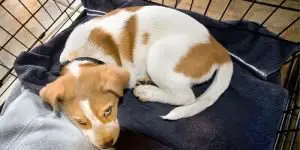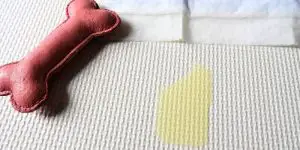
Why is my puppy pooping so much?
- Written by Dr. Cristina Vulpe
- Last updated

Key takeaways
- Too much fiber. If your pup’s diet is rich in fiber, whether coming from treats or their main food, they are going to poop more in terms of quantity and frequency.
- Eating kitchen scraps. Some ingredients in human food can lead to an upset tummy and more pooping, such as salt.
- Diet or environment changes. Puppies can become stressed or experience bowel movement changes when their routine or feeding is modified.
- Health problems. Anything ranging from bacterial and viral infections to internal parasites can lead to an increase in pooping frequency.
- Medication. Some drugs used for treating health issues have a laxative effect, so your dog might experience diarrhea as a result of undergoing treatment with them.
In this article
Is it normal for my puppy to poop a lot?
In most cases, yes.
Puppies are known to poop a lot, especially in their first few weeks of life. Their intestinal tract is under development, so they will begin to poop more rarely as they age.
However, when they are still very young, they need a lot of energy coming from their diet, so they tend to process food much faster compared to adults.
Young pets, such as those that are 6 weeks of age can sometimes poop once an hour or even once every thirty minutes, depending on how often they are fed.
As your dog grows, they will also need more food, which means that the amount of poop that they will eliminate is also going to be larger.

How many times a day does a puppy poop?
It all depends on their age.
Consequently, puppies as young as 2 weeks of age might poop after every meal. At 8 weeks, puppies can poop once every three hours or so.
Once puppies reach the age of 12 weeks, though, they should poop only 5-6 times a day.
When they reach the age of 4 months, they’ll only have to poop three to four times a day.
By the time your pup gets to be 6 months old, they’ll poop two to three times a day, which is why you will be able to schedule your walks accordingly.
Reasons Why Your Puppy is Pooping More Often
Lots of fiber
Fiber is an essential nutrient for dogs as it helps them balance their digestion so that they pass stools on a regular basis.
However, sometimes the amount of fiber present in a dog’s diet can be too high and can come from various sources, such as treats, kibble, and even canned food varieties.
Some fiber sources are healthy, such as pumpkin, but others can cause your pup to experience an upset stomach (such as wheat and corn).
Cheap dog food brands usually contain too much fiber and not a lot of other valuable nutrients for puppies, such as protein, healthy fats, or vitamins and minerals.
Too much food
All pet parents want to make sure that their puppies are getting enough food, but the problem with overfeeding is that not only can it cause problems such as obesity, it can also lead to an increase in pooping frequency.
Check with your vet on how often you should feed your dog depending on their age.
The good thing is that most pet food manufacturers clearly state the recommended amount on their packaging, which makes your task much more manageable.
As an example, a 7-week puppy should eat no more than four times a day and receive about 20g of food per kg of body weight for the whole day.
Your dog’s size also has a say when it comes to how much you feed them, since smaller breeds usually require less kibble or pouches compared to their larger counterparts.
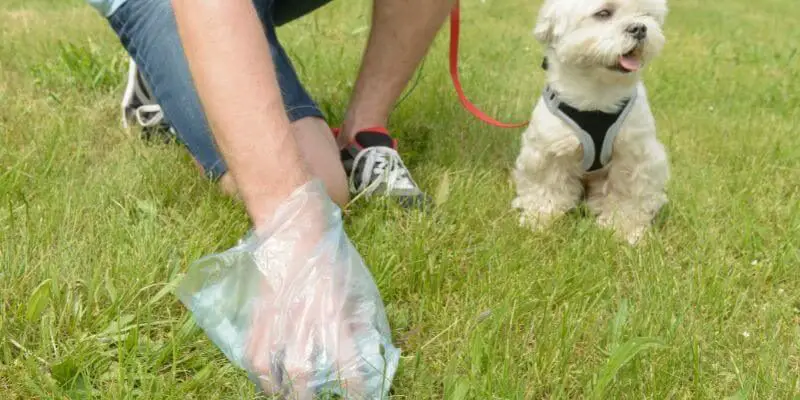
Eating kitchen scraps (or other bad food)
Any type of kitchen scraps your pet has access to can not only add to the overall amount of food that they get in a day, but they might also cause some health complications.
For instance, dogs are not supposed to have as much salt as people do every single day.
Besides, sodium largely influences bowel movements, which means that your puppy might end up pooping more frequently if they got into your trashcan and ate some salty leftovers.
Diet or environment changes
Dogs, in general, and puppies, in particular, can be quite sensitive to any changes to their routine.
Whether that means you are feeding them at different hours or completely changing their diet all of a sudden, your dog might end up passing more stools because of these factors.
Try to be as consistent with your pup’s schedule as much as possible.
If your vet has instructed you to change their diet, make sure you do so gradually by mixing variable amounts of the new kibble into the old one every day until you completely replace it.
As for changes in their environment, dogs tend to mark their territories and may also go into sensory overload when being moved into a new place. Both their frequency of urination and defecation will change as a consequence of that.
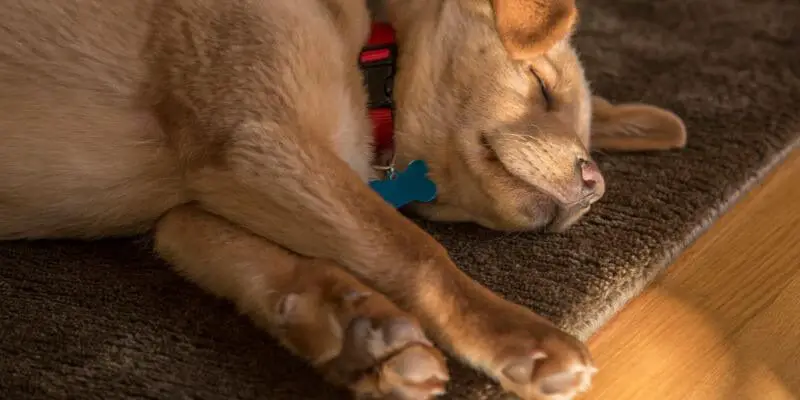
They may have a medical condition
Frequent pooping along with large amounts of faeces can be a sign of disease.
It could be that your dog developed an infection after eating something bad, or they may have come in contact with a sick animal and might have developed gastroenteritis as a result.
Internal parasites can also influence how your puppy poops because they irritate the mucous membrane of the intestine, so your dog is going to go potty much more frequently than they normally do.
Taking your pet to the vet can lead to a correct diagnosis and an effective treatment, so don’t wait for long.
They’re on medications and have had immunizations
Virtually any type of medication can influence the way your puppy’s body works, and if it also comes with side effects, you will notice changes in their defecation and urination habits.
Your dog’s vaccines can protect them against potentially lethal diseases, so it’s important to stick to your vet’s advice in this respect.
However, vaccines are biological products, so your puppy might experience some adverse reactions such as drowsiness, a light fever, or bowel movement modifications.
If your dog has recently been immunized or is undergoing treatment for a health condition, pooping more could be normal.
They’re stressed or depressed
Humans and animals alike can become the victims of stress depending on whatever they experience in a day or over a longer period of time.
Like people, puppies can have faster bowel movements if they’re anxious, nervous, or have been taken to the vet, for example.
On the other hand, in most of these situations, it is important to see whether the faeces have a normal consistency or if your dog is actually experiencing an episode of diarrhea.
As you may know, puppies are much more sensitive compared to adult dogs so they can easily and quickly get dehydrated. If your pet has diarrhea for more than a few hours, take them to the animal hospital.
Stress diarrhea can happen for up to two days.
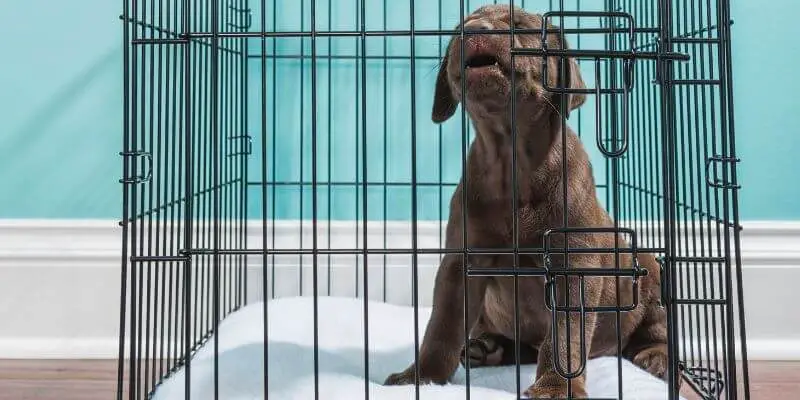
When is your puppy’s toilet behavior not normal?
As impossible as it can be for you to predict when your puppy might feel the need to defecate, there are some ways to tell that things aren’t really going as they’re supposed to.
Very increased frequency
If your dog’s normal pooping frequency is five times a day and they start pooping ten times a day, something is clearly wrong, and you should take them to the vet.
Normal vs. abnormal puppy poop
Whenever you walk your puppy and they go potty, you should take a peek at how their feaces look. It might sound unpleasant, but it is beneficial when it comes to preventing health conditions.
A healthy pup’s poop should be compact and quite firm and should somewhat resemble a log. In terms of color, medium to chocolate brown is the best.
Abnormal colors range from red and yellow to black and green.
Mucus
Your dog’s faeces might also be covered in mucus, which is an alarming sign, or they might pass undigested food, which could be a sign of food intolerance or malabsorption.
Intestinal parasites
If you see worms (adults, larvae, or eggs) in your dog’s faeces, it’s time to deworm them.
Dogs should be dewormed once every three to six months, but puppies should receive treatment for intestinal parasites even more often.
Vets sometimes recommend giving them safe deworming products once every two to three weeks until they reach the age of 12 weeks.
Foreign bodies
Any unnatural materials such as plastic pieces, wire or string, or rocks should immediately cause concern, and you should take your dog to the veterinary clinic.
How to know my puppy has an upset tummy
If your pup has an upset tummy, they might exhibit a number of signs, such as the following:
- Vomiting
- Diarrhea
- Being more lethargic than usual
- Abdominal pain
- Constipation (not going potty for more than two whole days)
- Decreased appetite for food or water
Remember that an upset stomach can be caused by many factors, including possibly fatal conditions such as Parvovirus, intestinal obstruction or occlusion, ulcers in any part of the digestive tract, or bloat.
If you have any concerns whatsoever about your puppy’s health, don’t hesitate to take them to the vet right away.
References
- https://www.akc.org/expert-advice/health/dogs-poop-says-health/
- https://www.ncbi.nlm.nih.gov/pmc/articles/PMC7149883/
- https://www.sciencedirect.com/science/article/abs/pii/S1938973615300167
- https://www.americanhumane.org/fact-sheet/housetraining-puppies-dogs/
- https://www.sciencedirect.com/science/article/pii/S0378113516303492

Written by: Dr. Cristina Vulpe
Dr. Cristina Vulpe is a certified veterinarian who graduated in 2011 and earned her PhD in canine oncology in 2015, with a thesis focused on the diagnosis of abdominal tumors in dogs.


